KANT:
THE AESTHETIC JUDGEMENT AND THE BEAUTIFUL IN MUSIC
DOI:
https://doi.org/10.7443/problemata.v14i2.67870Keywords:
Aesthetic jugment, Beautiful, Music, KantAbstract
In the Critique of Judgment, Kant states that, as an art that expresses the play of sensations, music must employ the “language of affections” and, thus, belongs more to the art of the pleasant than to the fine arts. In this way, music could not properly be considered a superior form of art. As an art expressed in the language of affections, music would be irremediably linked to emotions and sensations that, as individual experiences, can never be universalized, as required by the judgment of aesthetic taste. Not being able to access universalization, the judgment of taste in music would then be more a judgment about the pleasant than a judgment about the beautiful. However, at the same time, Kant develops, also in the Critique of Judgment, other arguments in which he attributes to music the character of art as a “beautiful game of sensations”, suggesting a hesitation regarding its status as an art form. We will examine this assessment of music as art formulated by Kant in the Critique of the Faculty of Judging, in order to understand the position that Kant assigns to it among the fine arts.
Downloads
References
CRAWFORD, Donald W. Kant. In: GAUTE, Berys; LOPES, Dominic McIver (org.). The Routledge Companion to Aesthetics. Abingdon: Routledge, 2000. p. 51-64.
FÖRSTER, Eckart. Strawson sobre o Juízo Estético em Kant. Analytica. Rio de Janeiro, v. 13, n. 1, 2009, p. 13-38.
GINSBORG, Hannah. Kant In: GRACYKE, Theodore; KANIA, Andrew (org.). The Routledge Companion to Philosophy and Music. Abingdon: Routledge, 2011. p. 328-338.
KANT, Immanuel. Crítica da Faculdade de Julgar. Trad. Fernando Costa Mattos. reimp. Petrópolis: Vozes, 2018.
KANT, Immanuel. Kritik der Urteilskraft. Leipzig: Reclam, Digitale Bibliothek, v. 10.
MATHERNE, Samantha. “Kant’s Expressive Theory of Music”. In: Journal of Aesthetics and Art Criticism, vol. 72. Disponível em:
http://libgen.li/ads.php?md5=337e725e86b4b4f9663fae0630d45c38&downloadname=10.1111/jaac.12076, Acesso em: 4 nov. 2021.
TUNA, Emine Hande. “Why didn’t Kant think highly of music?”. In: Violetta L. Waibel and Margit Ruffing (org.). Natur und Freiheit: Akten des XII. Internationalen Kant-Kongresses 2015.Berlin: De Gruyter, 2018. Disponível em:
https://ehandetuna.files.wordpress.com/2019/07/why_didn_t_kant_think_highly_of_music.pdf#:~:text=To%20sum%20up%3A%20While%20it%20is%20true%20that,there%20is%20a%20certain%20consistency%20in%20his%20reasoning, Acesso em : 4 nov. 2021.
VACCARI, Ulisses Razzante. O Juízo Estético e o Sistema da Filosofia Kantiana: a Crítica do Juízo. Disponível em:
https://www.academia.edu/11697846/O_ju%C3%ADzo_est%C3%A9tico_e_o_sistema_da_filosofia_kantiana_a_Cr%C3%ADtica_do_Ju%C3%ADzo, Acesso em: 4 nov. 2021.
WEATHERSTON, Martin. 1996. Kant’s Assessment of Music in the Critique of Judgement. British Journal of Aesthetics. n. 36, v. 1, p. 56-65.
Downloads
Published
Issue
Section
License
Copyright (c) 2023 Maria Clara Cescato

This work is licensed under a Creative Commons Attribution 4.0 International License.
Authors who publish with this journal agree to the following terms:
- Authors retain copyright and grant the journal right of first publication with the work simultaneously licensed under a Creative Commons Attribution License that allows others to share the work with an acknowledgement of the work's authorship and initial publication in this journal.
- Authors are able to enter into separate, additional contractual arrangements for the non-exclusive distribution of the journal's published version of the work (e.g., post it to an institutional repository or publish it in a book), with an acknowledgement of its initial publication in this journal.
-
- Authors are permitted and encouraged to post their work online (e.g., in institutional repositories or on their website) prior to and during the submission process, as it can lead to productive exchanges, as well as earlier and greater citation of published work (See The Effect of Open Access).





